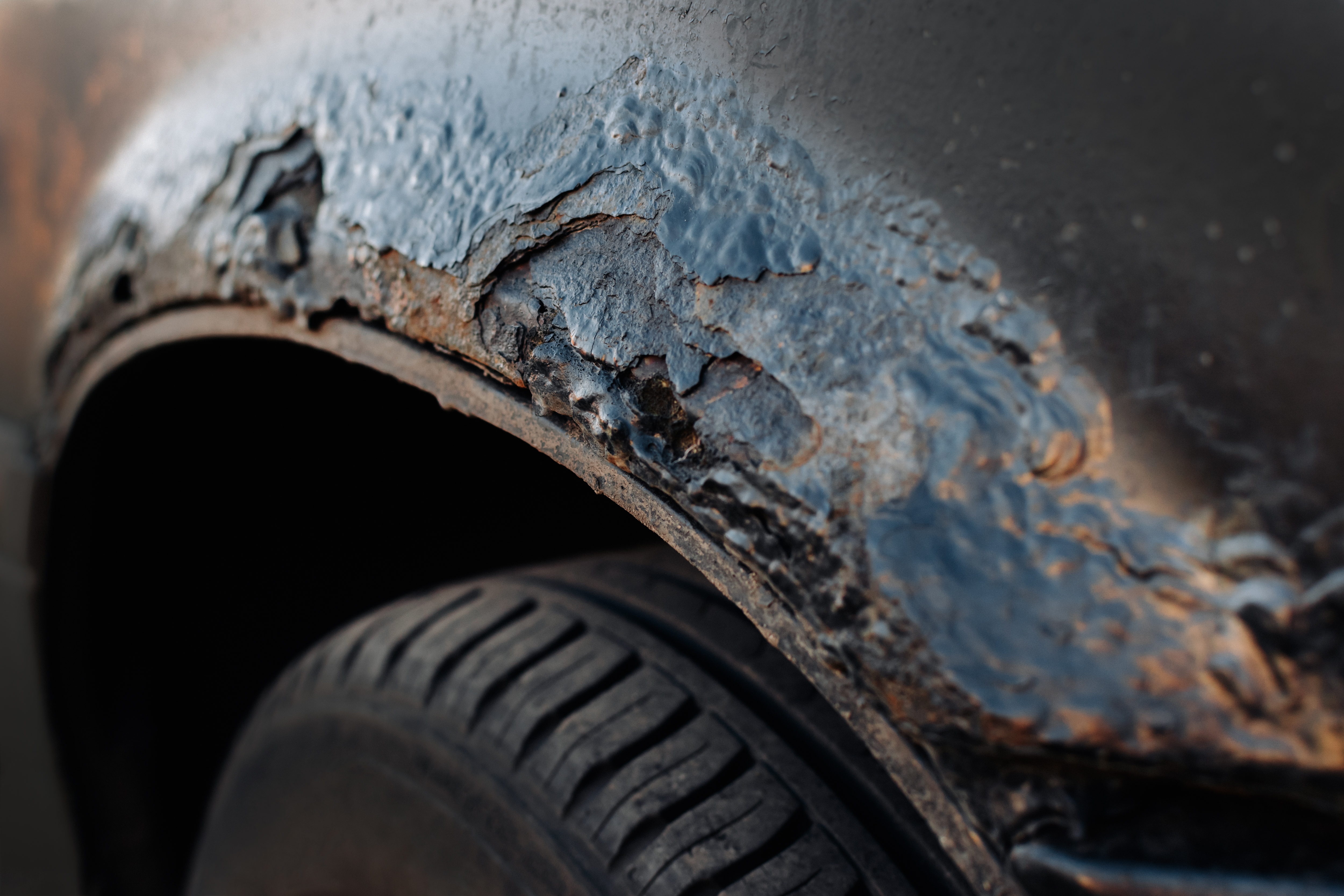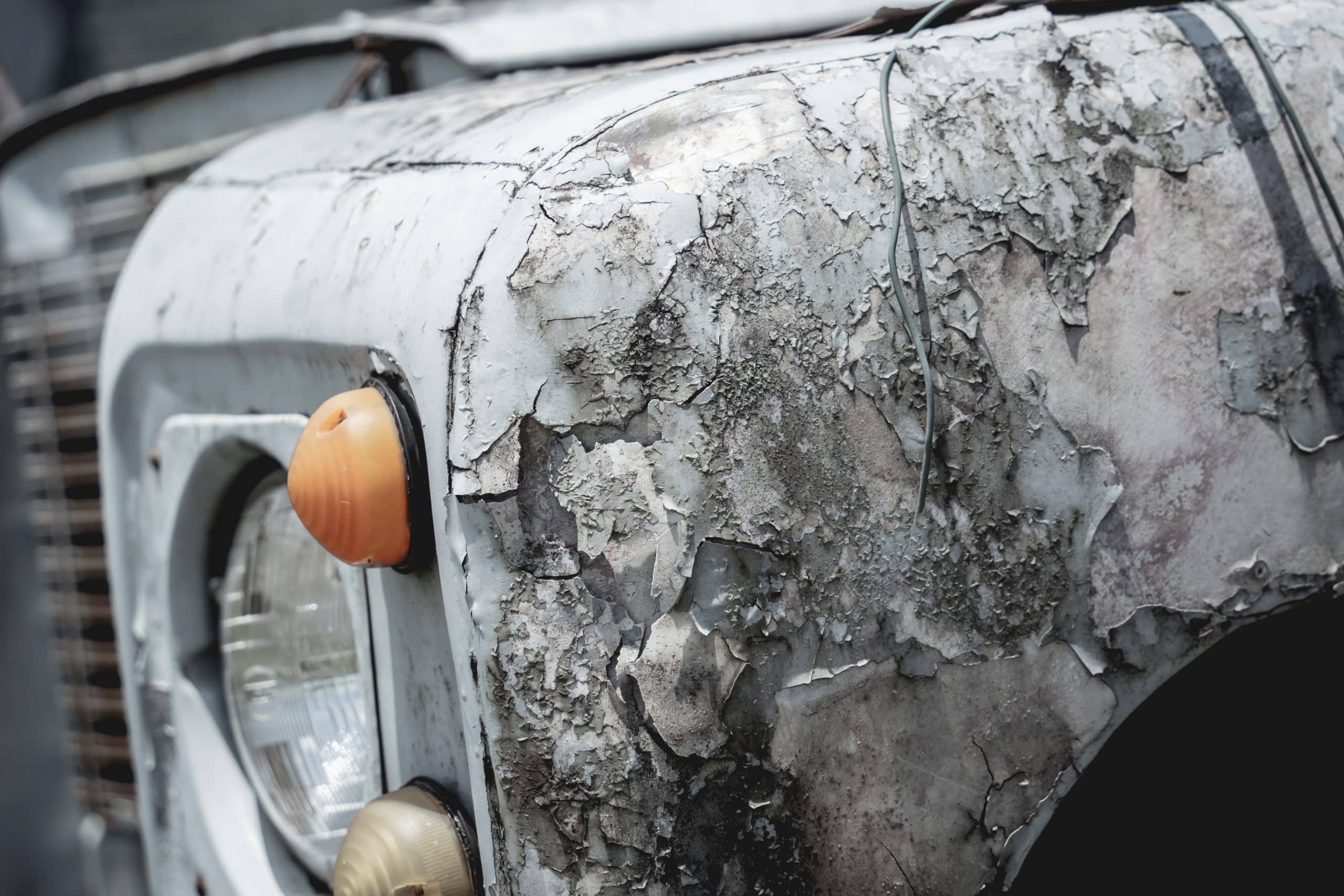Have you ever noticed that tractor trailers and fleets seem to age faster than fine wine? One culprit behind this premature aging process is corrosion. Yes, that pesky enemy of metal surfaces everywhere! But fear not, for there is a hero in the form of corrosion inhibitors ready to swoop in and save the day! In this blog post, we’ll dive deep into the world of corrosion inhibitors, exploring how they can extend the lifespan of your beloved tractor trailers and fleets. So buckle up and get ready to learn how to keep rust at bay and maximize your vehicle’s longevity!
Durability. Cost. Image. Three main factors in fleet decisions about trailer specifications that are directly affected by a common enemy – corrosion. From the roofline to structural members, suspensions, axles, landing gear and upper-couplers, constant bombardment by moisture and debris – as well as exposure to road salts and other de-icing materials – makes specifying trailers for corrosion protection of utmost concern to fleet managers. Equally aware of the challenge are trailer, system and component manufacturers, who are addressing the problems caused by corrosion with new technologies and processes.
Metal Damage: More than just the metal surface of the truck itself, corrosion can effectively destroy wheel-ends and lead to breakdown of the wheels. Moreover, degradation of vital metal components, such as the fasteners of the inner hub, can result in catastrophic damage to your commercial tires.
Unnecessary Breakdown: Corrosion can impact the underside components of your vehicle, creating a recipe for accidents to occur due to mechanical failure and resulting in unnecessary downtime.
What is corrosion?
Corrosion, wearing away due to chemical reactions, mainly oxidation (see oxidation-reduction, oxide). It occurs whenever a gas or liquid chemically attacks an exposed surface, often a metal, and is accelerated by warm temperatures and by acids and salts. Normally, corrosion products (e.g., rust, patina) stay on the surface and protect it. Removing these deposits re-exposes the surface, and corrosion continues. Some materials resist corrosion naturally; others can be treated to protect them (e.g., by coating, painting, galvanizing, or anodizing).Corrosion is a natural process that occurs when metals come into contact with moisture, oxygen, and other corrosive agents, like road salt. corrosion, wearing away due to chemical reactions, mainly oxidation (see oxidation-reduction, oxide). It occurs whenever a gas or liquid chemically attacks an exposed surface, often a metal, and is accelerated by warm temperatures and by acids and salts.
Even the coastal air near oceans can increase vehicle corrosion. The result is the formation of rust, tarnish, or other forms of corrosion, leading to a weakening of the metal structure and, ultimately, reduced longevity.
Detergents play a vital role in cleaning processes, removing dirt, grime, and contaminants from surfaces. However, the cleaning process itself can sometimes worsen corrosion, especially on metal. This is where corrosion inhibitors come into play.
Perhaps the dirt and grime clinging to your trucks are doing far worse damage than you think. Your trucking company’s greatest enemy is corrosion. Metal corrodes when it reacts with another substance such as oxygen, hydrogen, an electrical current or even dirt and bacteria.

Importance of corrosion prevention in extending the life of tractor trailers and fleets
Corrosion, the silent enemy of metal surfaces, is a natural process where materials deteriorate due to chemical reactions with their environment. When it comes to commercial vehicles like tractor trailers and fleets, corrosion can wreak havoc on critical components such as the chassis and undercarriage. Luckily, corrosion inhibitors are here to save the day! These specialized chemicals form a protective layer on metal surfaces, acting as a shield against rust and deterioration. The importance of corrosion prevention in fleet management cannot be overstated. By proactively implementing corrosion inhibitors, you can significantly extend the lifespan of your vehicles and reduce maintenance costs in the long run. It’s all about keeping your fleet in top shape for years to come! The average tractor lasts 700k miles. Increase that with regular cleaning and corrosion inhibitor applications.
Corrosion Mechanisms in Tractor Trailers and Fleets
A. Causes of corrosion in commercial vehicles
B. Impact of corrosion on vehicle lifespan and performance
Corrosion is the silent enemy of tractor trailers and commercial fleets, lurking beneath the surface and slowly deteriorating vital components. The causes of corrosion in these vehicles are varied, from exposure to road salt and environmental moisture to mechanical wear and tear. Rust can take hold on chassis, undercarriages, and exposed metal surfaces, compromising structural integrity.
The impact of corrosion on vehicle lifespan is significant – it can lead to premature deterioration of critical parts, affecting performance and safety. A corroded fleet not only looks unprofessional but also incurs higher maintenance costs over time. Regular inspections and proactive measures are essential to combat this pervasive threat. By understanding how corrosion works its way into our vehicles, we can better protect our assets for the long haul.
If a corrosion inhibitor acts at the anode, it provides anodic protection. Anodic corrosion inhibitors prevent the formation of metal oxides in the substrate. Often, they are partially soluble salts of anions containing phosphorous or boron. These anions can have variable oxidation states (charges) depending on the chemical environment.
The efficacy of a corrosion inhibitor can vary widely depending on the coating system binder and environmental conditions. When specifying or formulating protective coatings based on corrosion inhibitors, the end-use application, expected service life and exposure conditions must be considered.
Understanding Corrosion Inhibitors
- Definition and function of corrosion inhibitors
- Types of corrosion inhibitors commonly used in commercial vehicles
- Mechanisms of action of corrosion inhibitors
Corrosion inhibitors are like superheroes for your tractor trailers and fleets, protecting them from the villainous rust that can eat away at their metal surfaces. These specialized chemicals work by forming a protective barrier on the metal, shielding it from moisture and other corrosive elements.
There are various types of corrosion inhibitors used in commercial vehicles, including zinc-rich coatings, phosphate-based products, and organic compounds like amines or mercaptans. Each type has its own unique way of combating corrosion based on the specific needs of the vehicle.
The mechanisms of action of these inhibitors can vary but generally involve either sacrificial protection where the inhibitor reacts with corrosive agents to prevent damage or barrier protection where a film is formed to physically block out moisture and oxygen. It’s fascinating how these tiny molecules can make such a big difference in prolonging the life of your valuable fleet assets.

Benefits of Corrosion Inhibitors in Extending Vehicle Life
A. Prevention of corrosion-related damage to critical components
B. Maintenance of structural integrity and functionality
C. Reduction of repair and replacement costs
D. Enhancement of vehicle resale value
Corrosion inhibitors play a crucial role in prolonging the lifespan of tractor trailers and fleets by preventing damage to critical components. These inhibitors create a protective barrier that shields metal surfaces from rust, corrosion, and degradation caused by harsh environmental conditions like road salt. By maintaining the structural integrity and functionality of vehicles, corrosion inhibitors help ensure optimal performance on the road.
Furthermore, the use of these inhibitors can significantly reduce repair and replacement costs associated with corrosion-related damage. By implementing proactive measures to prevent rust and deterioration, fleet owners can save time and money that would otherwise be spent on extensive repairs or part replacements.
Moreover, corrosion inhibitors contribute to enhancing the resale value of tractor trailers by preserving their appearance and mechanical condition. Vehicles treated with effective anti-corrosion products are more attractive to potential buyers due to their well-maintained condition and longevity.
Factors Influencing the Effectiveness of Corrosion Inhibitors
A. Quality and formulation of the corrosion inhibitor product
B. Application method and frequency
C. Environmental conditions and operating environment of the fleet
D. Maintenance practices and adherence to recommended procedures
The effectiveness of corrosion inhibitors in protecting tractor trailers and fleets is influenced by various factors that must be carefully considered.
The quality and formulation of the chosen corrosion inhibitor product play a crucial role in determining its ability to create a protective barrier against rust and corrosion. It is essential to select high-quality products specifically designed for commercial vehicles.
The application method and frequency of the corrosion inhibitor are significant factors in ensuring thorough coverage and long-lasting protection. Proper application techniques can maximize the product’s effectiveness in safeguarding critical components from corrosive elements.
Moreover, environmental conditions and the operating environment of the fleet can impact how well the corrosion inhibitor performs over time. Harsh weather conditions or exposure to road salt can accelerate corrosion, emphasizing the need for robust protection measures.
Additionally, maintenance practices and adherence to recommended procedures are essential for maintaining optimal protection levels provided by corrosion inhibitors. Regular inspections and reapplications as needed are key to prolonging the lifespan of tractor trailers and reducing maintenance costs.
Case Studies or Examples
A. Real-world examples of fleets implementing corrosion inhibitors
B. Comparative analysis of vehicle lifespan and maintenance costs with and without corrosion inhibitors
In real-world scenarios, fleets have successfully implemented corrosion inhibitors to protect their vehicles from rust and corrosion. By proactively applying these inhibitors, fleet managers have seen a significant reduction in maintenance costs associated with repairing or replacing corroded parts.
Comparative analyses between fleets using corrosion inhibitors and those without have shown a clear advantage for the former. Vehicles treated with inhibitors exhibit extended lifespans and improved performance over time compared to untreated counterparts.
These case studies serve as concrete evidence of the effectiveness of corrosion prevention strategies in fleet management. They highlight the tangible benefits that come from investing in protective measures to safeguard tractor trailers and commercial vehicles against the damaging effects of rust and corrosion.
By learning from these examples, other fleet operators can make informed decisions about incorporating corrosion inhibitors into their maintenance routines to ensure longevity and reliability for their assets.

Challenges and Limitations
A. Potential drawbacks or limitations of corrosion inhibitors
B. Factors that may reduce the effectiveness of corrosion inhibitors
C. Strategies to address challenges and optimize the use of corrosion inhibitor
When it comes to using corrosion inhibitors in maintaining tractor trailers and fleets, there are certain challenges and limitations that need to be considered. One potential drawback is the effectiveness of the inhibitor product itself. Factors such as the quality and formulation of the corrosion inhibitor can impact its ability to provide long-lasting protection against rust.
External factors like environmental conditions or operating environments can also affect how well corrosion inhibitors work. For instance, extreme weather conditions or exposure to road salt can accelerate metal corrosion despite regular inhibitor application.
To address these challenges and optimize the use of corrosion inhibitors, implementing proper maintenance practices is key. This includes selecting high-quality products tailored to specific needs, ensuring correct application methods, and monitoring effectiveness regularly for any adjustments needed in the prevention strategy.
By understanding these limitations and strategies for optimization, fleet managers can proactively tackle rust issues and extend the lifespan of their vehicles effectively.
Best Practices for Implementing Corrosion Inhibitors in Fleet Management
A. Selection of appropriate corrosion inhibitor products
B. Integration of corrosion prevention measures into maintenance protocols
C. Training and education for fleet operators and maintenance staff
D. Monitoring and evaluation of corrosion protection effectiveness
When it comes to implementing corrosion inhibitors in fleet management, selecting the right products is crucial. Look for inhibitors that are specifically designed for heavy-duty commercial vehicles to ensure maximum protection.
Integrating corrosion prevention measures into regular maintenance protocols is essential for long-term effectiveness. Make it a routine practice to apply inhibitors and inspect for any signs of corrosion during maintenance checks.
Educating fleet operators and maintenance staff on the importance of corrosion prevention is key. Provide training on how to properly apply inhibitors and recognize early signs of rust or corrosion.
Monitoring and evaluating the effectiveness of your corrosion protection efforts is vital. Keep track of application frequency, product performance, and any areas showing vulnerability to rust or corrosion.
Stay proactive in maintaining your fleet’s condition by following these best practices consistently. Remember, prevention is always better than cure when it comes to protecting your valuable assets from the damaging effects of corrosion.
Summary of the benefits of corrosion inhibitors in extending the life of tractor trailers and fleets
A. Importance of proactive corrosion prevention strategies for fleet management
B. Recommendations for further research or implementation efforts
Corrosion inhibitors play a crucial role in extending the lifespan of tractor trailers and fleets by protecting them from rust and corrosion. Proactive corrosion prevention strategies are essential for fleet management to reduce maintenance costs and ensure operational efficiency. Implementing regular washing and applying corrosion inhibitors can significantly enhance the durability of vehicles, maintaining their structural integrity.
To further improve corrosion prevention efforts, research into advanced inhibitor formulations and application techniques is recommended. Investing in high-quality products and integrating preventive measures into maintenance protocols can help fleet managers stay ahead of potential damage caused by road salt corrosion or environmental factors.
By staying proactive in combating corrosion, fleet operators can optimize vehicle performance, minimize repair expenses, and increase overall reliability on the road. It’s essential to prioritize ongoing maintenance practices that include protective measures against undercarriage and chassis corrosion for long-term cost savings.
How to get the most mileage out our a tractor trailer
Looking to maximize the lifespan of your tractor trailer and get the most mileage out of it? One key aspect to consider is proactive corrosion prevention. Corrosion can significantly impact the structural integrity and performance of your vehicle, leading to costly repairs and early retirement.
Regular washing to remove road salt buildup and applying corrosion inhibitors can help protect against rust and metal deterioration. By creating a protective barrier on the undercarriage and chassis, corrosion inhibitors act as a shield against environmental factors that contribute to corrosion.
Incorporating these preventive measures into your maintenance routine not only extends the life of your tractor trailer but also reduces overall maintenance costs in the long run. Stay ahead of corrosion by implementing a consistent washing schedule and using quality anti-corrosion products tailored for commercial vehicles.
Regular washing and corrosion inhibitor application extends tractor trailer and fleet lifespan
Regular washing and applying corrosion inhibitors are essential practices to extend the lifespan of tractor trailers and fleets. Washing helps remove dirt, grime, and road salt that can accelerate corrosion on metal surfaces. By keeping the exterior clean, you create a barrier against rust formation. Additionally, applying corrosion inhibitors adds an extra layer of protection to critical components, such as the undercarriage and chassis.
These preventative measures not only enhance the appearance of your vehicles but also contribute to their longevity. Corrosion inhibitors work by forming a protective film over metal surfaces, reducing the impact of environmental factors like moisture and salt. This proactive approach minimizes the risk of structural damage caused by rust.
By incorporating regular washing and corrosion inhibitor application into your fleet maintenance routine, you invest in preserving your assets for years to come. Prioritizing these simple yet effective strategies can result in significant cost savings by reducing repair and replacement expenses associated with rust-related damage.
How to stay ahead of corrosion
Corrosion is a persistent threat to the longevity and performance of tractor trailers and fleets. To stay ahead of this destructive force, proactive measures are crucial. Regular inspections are key in identifying early signs of corrosion before they escalate. Implementing a strict maintenance schedule that includes washing the vehicles to remove corrosive substances like road salt can significantly reduce the risk of damage.
Applying corrosion inhibitors provides an added layer of protection by forming a barrier against moisture and other corrosive elements. Investing in quality inhibitors tailored for commercial vehicles can help extend their lifespan and maintain structural integrity. Additionally, storing vehicles in covered areas when not in use can shield them from environmental factors that accelerate corrosion.
Educating staff on proper cleaning techniques and the importance of corrosion prevention fosters a culture of vigilance within fleet management. By staying proactive and vigilant, fleets can effectively mitigate corrosion risks and prolong the life of their valuable assets.
Reduced tractor trailer maintenance cost with corrosion inhibitor
By incorporating corrosion inhibitors into your fleet management practices, you can significantly reduce maintenance costs associated with rust and corrosion. These protective measures not only extend the lifespan of your tractor trailers but also contribute to maintaining optimal performance and structural integrity.
Regular application of corrosion inhibitors, coupled with proactive maintenance protocols such as washing to prevent corrosion, can help you stay ahead of potential issues caused by road salt corrosion or undercarriage damage. By creating a metal protective layer for tractor trailers, these anti-corrosion solutions offer a cost-effective way to preserve your vehicles over time.
Incorporating best practices for implementing corrosion inhibitors in fleet management can make a substantial difference in the longevity and efficiency of your commercial vehicles. Remember, taking preventive measures now can lead to significant savings in repair and replacement costs down the line. So why wait? Start protecting your fleet today and reap the benefits of reduced maintenance expenses and increased operational utilitytomorrow!



